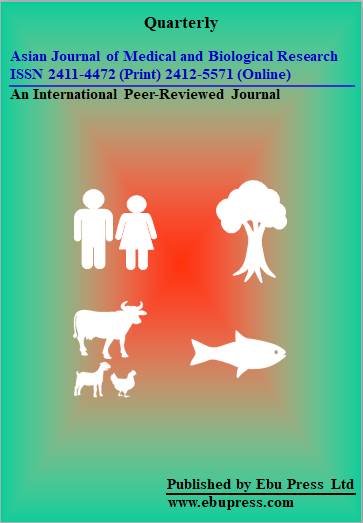Md. Rakibul Hasan, Md. Shakil Islam, Md. Mominul Islam, Jahagir Alam, Al Wasef, Md. Tanvir Hasan, Kazi Rafiq and Md. Shafiqul Islam
Abstract
PDF
In Bangladesh, excessive and haphazard antibiotic use is frequently observed in the poultry industry, which is a global issue in terms of antibiotic residue and resistance. This study aimed to detect ciprofloxacin residues in edible tissues and assess their impact on broilers' hematological and major enzymatic parameters. Thirty-day-old Cobb-500 broiler chicks were used to examine the effects of controlled and uncontrolled ciprofloxacin usage during the period from June to December 2021 at Bangladesh Agricultural University (BAU). On the 14th day, the chicks were randomly assigned to control, discriminate, and indiscriminate antibiotic groups. Treatment commenced from day 14, with the discriminate group receiving ciprofloxacin at 100 mg/L in drinking water for 7 days followed by a 7-day withdrawal period. Conversely, the indiscriminate group received ciprofloxacin at the same concentration for 14 days without any withdrawal period. Daily body weights of the broiler were recorded. On day 14, the body weights across all groups showed no significant differences, but by day 28, the indiscriminate group exhibited a significantly higher mean body weight (1601.43±15.50 g). Thin layer chromatography (TLC) analysis revealed the presence of ciprofloxacin residues in all samples from the indiscriminate group, while no residues were detected in the control group. In the discriminate group, residues were found in 2 liver samples, 3 kidney samples, 1 spleen sample, and 1 breast muscle sample, but not in thigh muscle samples. Hematological analysis indicated significant differences in total erythrocyte count (TEC), hemoglobin (Hb), and erythrocyte sedimentation rate (ESR) among the groups, with no significant differences in packed cell volume (PCV). Enzymatic analysis of blood serum for ALT and AST showed no substantial changes between treated and control birds. Therefore, the controlled use of ciprofloxacin in the poultry sector is crucial to safeguard human health.



